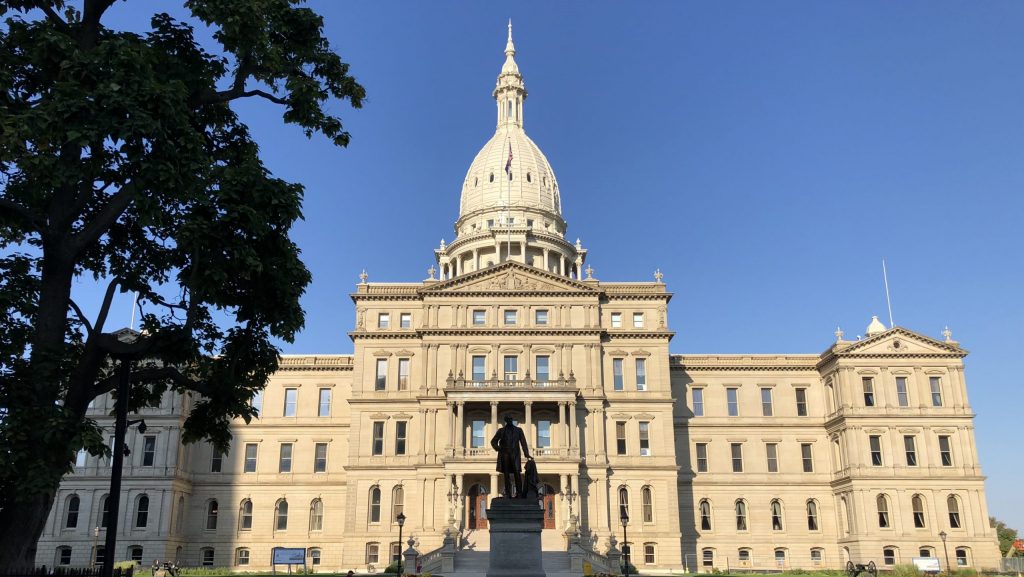Democrats eye control of Michigan Senate for first time in decades
Bridge Michigan’s Lauren Gibbons joins Cheyna Roth to talk about where things stand in Michigan as a result of the redistricting process.

Michigan State Capitol building.
Michigan Democrats have a chance to control the state legislature, due in part to new redistricting maps. While many Senate and House of Representative elections are close in Michigan, millions of dollars from across the country are funding Senate races.
Subscribe to MichMash on Apple Podcasts, Spotify, NPR.org or wherever you get your podcasts.
In this episode:
- Host Cheyna Roth catches up with Lauren Gibbons, capitol reporter for Bridge Michigan, to talk about the Michigan legislature ahead of the midterms.
- Gibbons reported Michigan democrats have a good chance of controlling the state senate and house of representatives.
- More close races are connected to Michigan’s new district maps being used in the election.
The Voters Not Politicians ballot initiative, passed in 2018, established a 13-person redistricting panel to draw new district maps. They were adopted in last December and this is the first election to use them.
“We saw the maps redrawn and in the state Senate, that meant that on paper the path to majority is very close,” Bridge Michigan Capitol Reporter Lauren Gibbons said. “Republicans are also putting up a lot of cash to try and protect the majority that they have retained for several sessions at this point.”
There are several close races Gibbons is keeping her eye on. In the 12th Senate district making up Macomb County, Rep. Kevin Hertel, D-St. Clair Shores, is running against Rep. Pamela Hornberger, R-Chesterfield. Another tight race is happening in Southwest Michigan’s 30th Senate district, where Rep. David LaGrand, D-Grand Rapids, is running against Sen. Mark Huizenga, R-Walker.
In the Michigan House, Gibbons is following the 103rd district race in the Traverse City area. Rep. Jack O’Malley, R-Lake Ann, is running against Democrat Betsy Coffia and the redistricting commission estimates the district is a 50-50 split between Republican and Democratic voters.
Michigan voters will see three proposals on their ballot, one being Proposal 3, which seeks to add reproductive rights to the state constitution, including abortion. Gibbons says it’s hard to predict how Prop 3 may impact voter turnout.
“We don’t really know how the abortion ballot initiative is going to impact who turns out, what level of turnout and if that’s going to benefit Democrats who are largely pro-abortion rights, or if that is going to benefit Republicans who are largely anti-abortion. That remains to be seen,” Gibbons said. “I think of the three ballot initiatives that we’re seeing, abortion has the most potential to impact how the state legislative races turn out, and other races, frankly.”
Don’t expect the Michigan legislature to slow down after Election Day. State senators and representatives who are term limited are trying to get “pet projects” done before they leave office. Both Republican and Democratic leaders are working to get their parties priorities approved.
“I always prepare for an aggressive lame duck regardless of who’s in office. And I think it’ll be interesting because we have an obviously divided Republican majority legislature and a Democratic administration, so that’s impacted over the last four years how much actually gets done before a session is over,” says Gibbons. “I guess we will see how much that impacts depending on who wins both the governor’s race and who claims the majority in both of these chambers.”
Read Lauren Gibbons’ story “Who will control the Michigan Legislature? This year, Democrats have a shot” for Bridge Michigan.
Related posts:
Trusted, accurate, up-to-date.
WDET strives to make our journalism accessible to everyone. As a public media institution, we maintain our journalistic integrity through independent support from readers like you. If you value WDET as your source of news, music and conversation, please make a gift today.
